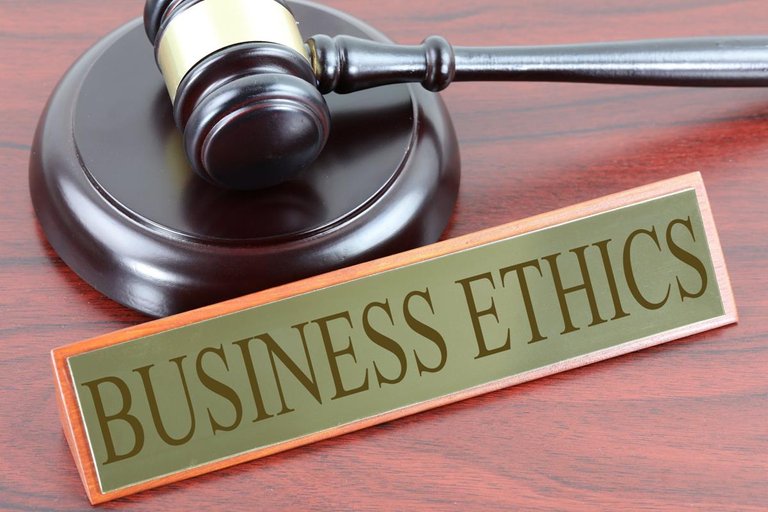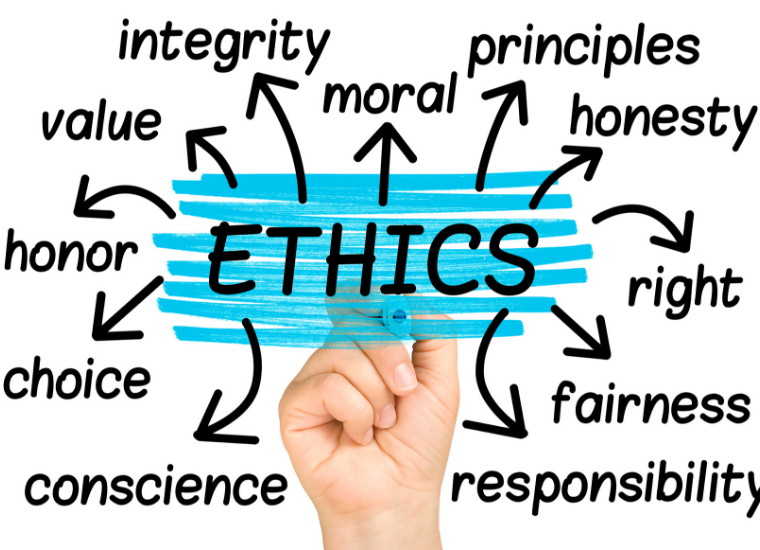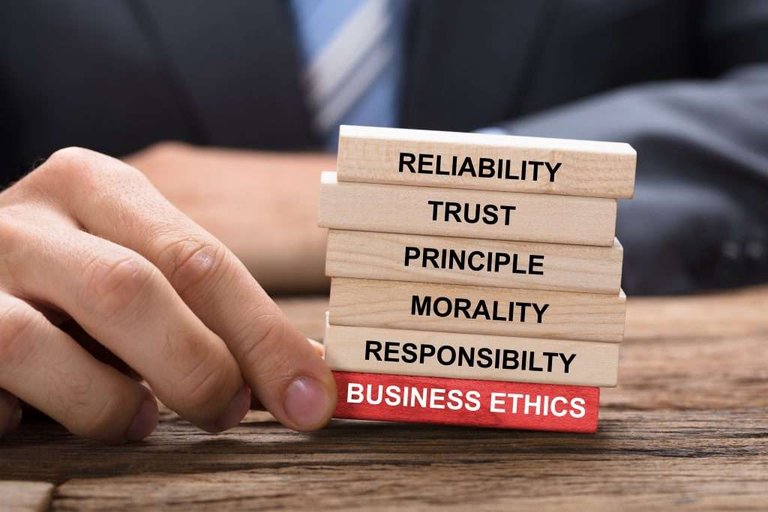A Brief Overview
Many people look at the functions of various businesses as unethical and that the essence of both business and ethics is completely contradictory. Which is the meaning of the term
‘oxymoron’: The claim is that any organization or company would do anything possible, whether right or wrong, in order to reach its business goals which might include higher sales, larger market share, and overcoming competition. Some examples of such management, include the case with World Com and Enron scandals and more that add to this dark image.
In fact, People often joke that "Business Ethics" is a contradiction in terms. What they are referring to is the apparently inherent conflict between morality and the pursuit of profit. The implication is that if a company has to choose between profits and doing the right thing, profits will always win. If business is about making a profit, can we really do so while still acting ethically?
I did a thoroughly research to this question and highly believe we all ought to know the answers to this question especially those engaged in the business world, whether it be, an entrepreneur, business owner or business personnel etc. Read more to get acquainted with the truth.
Before the full discussion its important that everyone to understands the various key terms in the question, which are bolded below in the question;
Is the term "BUSINESS ETHICS" an oxymoron role?
Definition of key terms;
Ethics are moral principles that govern a person's behavior or the conducting of an activity. It can also be defined as the discipline concerned with what is morally good and bad or morally right and wrong. The term is also applied to any system or theory of moral values or principles. In addition, ethics examines the rational justification for human moral judgments
of what is morally right or wrong.
A business is defined as an organization or enterprising entity engaged in a commercial, industrial, or professional activities. Businesses can be for profit entities or non-profit organizations. Business types range from limited liability companies to sole proprietorships, corporations and partnerships.
The term Business Ethics refers to the standards for morally right and wrong conduct in business. Law partially defines the conduct in business. Law partially defines the conduct, but “legal” and “ethical” aren’t necessarily the same. Business ethics enhances the law by outlining acceptable behaviors beyond government control. It can also be defined as a practice that determines what is right, wrong and appropriate in the workplace. It is often guided by laws and keeps companies and individuals from engaging in illegal activity such as bribery, discrimination etc
The term Oxymoron is a self-contradicting word or group of words. It can also be defined as a term for a figure of speech in which apparently contradictory terms appear in conjunction. It is made up of two or more words that seem to be opposite to each other, or actually are opposite. For example, the phrases "Wise fool", "Warm freezer", and "Legal murder" all have two words. In each one, the one word looks like the opposite of the other
word, just like we are looking at "Business Ethics" can these two terms 'Business' and 'Ethic' perfectly coexist or are they totally opposite.

FULL DISCUSSION;
Many people look at the functions of various businesses as unethical and that the essence of both business and ethics is completely contradictory. Which is the meaning of the term
‘oxymoron’: The claim is that any organization or company would do anything possible, whether right or wrong, in order to reach its business goals which might include higher sales, larger market share, and overcoming competition. Some examples of such management, include the case with World Com and Enron scandals that add to this dark image.
In fact, People often joke that "Business Ethics" is a contradiction in terms. What they are referring to is the apparently inherent conflict between morality and the pursuit of profit. The implication is that if a company has to choose between profits and doing the right thing, profits will always win. If business is about making a profit, can we really do so while still acting ethically?
Actually, doing the right thing can sometimes be quite costly for a business, and doing something unethical may pay off, at least in the short term.
To a small extent, the term Business Ethics is an oxymoron role is justified as true as discussed by the following:
Business requires aggressive competition with other businesses, an insatiable appetite for money and power, and stringent business principles. It is difficult to achieve these business ideals by being overly ethical.
That business ethics does not play a role in the business world where making profit is the motivation for setting up and running a business. Examples of contemporary use of unethical measures include Enron (2001), Tyco International, Lehman Brothers (2008), WorldCom (2002), the subprime mortgage scandal and more that led to the great recession. The examples show that even though business ethics is lauded as vital in business, it does not apply in the business world and only exist as a concept. In most cases, high profits are attained by engaging in unethical practices. In addition, it reduces profits; business ethics reduces the profit earning ability of an organization by putting limits to its operations.
Companies working on ethical values can’t focus on profit maximization by exploiting others. They need to give equal attention to the interest of its stakeholders like customers,
employees, society, creditors and government. Business running on an ethical path need to forego extra profits, which adversely affect their growth and revenue. Hence making the term
business ethics truly oxymoron.
It is considered that the responsibility of a buyer or customer is to conduct due diligence to ensure that a product or service on sale is of high standards. In the objective of attaining sales, businesses provide goods and services that match the financial abilities of customers. For example, during an economic recession, customers have little money to spend. Therefore, businesses cannot provide the same goods and service they provide when customers have a lot of money to spend. This is because products of high quality have more expenses and that is why they are expensive. However, customers consider it their right to receive the same quality of service all the time. To businesses, this is hard to achieve unless customers are willing to spend more money. Otherwise, services will be of a lower quality. This justifies the fact that the term business ethics is an oxymoron.
The contradiction presented by business ethics is similar to that which faces employees when required to make decisions that involve conflict of interest. Business and ethics have different objectives that are incompatible. Business values conflict whereas ethics does not.
Aggressive competition for available resources. The globally accepted concept of business is competition for available resources while trying to hoard as much resources as possible.
Aggressive competition leads to creation of a hierarchy that divides people into different economic classes leading to elimination of those who are unable to compete. This is considered unethical because it does not give equal opportunities to everyone. However, that is the foundation for success for any business today because due to over exploitation of resources it has resulted to scarcity of resources. Hence the need for aggressive competition. Where by more resources means more product, more sales and profit. This makes various businesses use aggressive measures and do whatever it takes to get more resources, this may include various methods that are unethical for example bribery that may be done to create favor for more resources.
Businesses prioritize by first doing what is right for their operations and then what is right for customers. Furthermore, business ethics is an oxymoron when looked at from an altruistic perspective. For example, in some religions such as Islam, taking interest is unethical. However, it is ethical in many other religions (Boatright, 2012). This view represents an extreme side of business ethics that is determined by religion.
Time consuming and costly to implement. Implementation of ethics within the business practices is a time consuming process that requires large efforts on the part of the organization. Businesses need to properly learn about these ethics for their successful implementation and this is costly and time consuming to businesses for example in training and using seminars to teach and make sure employees learn and properly implement the code
of ethics of an organization. This activity involves costs and time to execute. Hence promoting and further justifying the fact that indeed the term business ethics is an oxymoron
In fact, the statement that Ethics is not ideal for small businesses is supported. Ethical standards are not suitable for small scale business as it will lower their profit. Most small scale businesses cannot afford to lose some profit for the sake of running their operations ethically. It can hamper their growth and survival in today’s stiff competition. Following these principals brings extra costs to the business which is not feasible for most small scale businesses that survive on very low working capital. Making the term business ethics an oxymoron.
Many business decisions and operations involve intricate situations that are neither fully ethical nor fully unethical. As such, it is difficult for businesses to do the right thing. Values such as respect, honesty, and trust determine an individual’s ethical behavior. However, they are disregarded during tough situations that demand stringent measures. The same principle applies to business. Some situations are so difficult that they necessitate measures that are otherwise considered unethical. And this too justifies the term business ethics as an oxymoron. An example of situation can be where a company’s reputation is on the line and a manager is forced to give a bribe to save the company from collapsing or being closed
The classical view says that management’s handiest social responsibility is to maximize earnings (Branco & Rodrigues, 2007). Milton Friedman also argued that a manager’s important obligation is to operate the Business and meet the quality wishes of the shareholders. From this view, it regards business ethics, as an oxymoron due to the fact business is visible to accomplish the pursuit of self-interest at the same time as ethics is constantly diagnosed as the attention of others. Those who preserve this view will pick doing the component that's ‘suitable’ for their corporations without worrying about others.
Alternatively, the socioeconomic view states that managers need to also should not forget about protecting and improving society’s welfare while they are making profits for the corporation. Supporters of the socioeconomic view contend that managers ought to be worried with maximizing economic returns and making contributions themselves to their community and this also further proves the fact that the term business ethics is indeed an oxymoron.
In conclusion;
As explained above, to small extent, business ethics is an oxymoron because of the incompatibility between business and ethics. They both have different aims. Success in business requires practices that are considered unethical by the society. For example, aggressive competition and elimination of competitors by stringent measures is considered unethical because it denies other businesses an opportunity for prosperity. Business and ethics are incompatible. Therefore justifying the term “Business Ethics” is an oxymoron role as true to a small extent and mostly short run.
However, to a much Larger extent, No, the term Business Ethics is Not an oxymoron. The corporate pursuit of profit can and will, and forever strive alongside ethical behavior. The notion that business ethics is an oxymoron is NOT TRUE rather FALSE, as business and ethics can perfectly coexist and this is supported by the following:
If not controlled or put in check unethical behavior can be very costly to any business in not only finances and reputation but also in very many other negative results and effects like poor
employee and organization performance, high employee turnover and more. Just few examples like popular cases of companies that have faced consequences of unethical behavior are US Energy giant Enron (2001), Arthur Anderson (2001), Lehman Brothers (2008), Northern Rock 2008, Polly Perk International (1990), The Bank of Commerce and Credit International BCCI (1991). The Barings Bank, UK 1997, WorldCom (2002), Peregrine Systems Limited (2002), Adelphia Communication Company Ltd (2002), Tyco International Ltd (2001) and more, to mention but a few among very many others, confidently justifies the term that Business Ethics is indeed NOT an oxymoron role.
Ethics are essential to any business because they are the regulations concerning the kind of culture within the working environment. Moral values are the measuring instrument regarding
the way in which everything should be performed within the organization. The results of ethical conduct within the production management department, for example, will create a good reputation for the company in the market and, thus, bringing more profit to the organization as a whole.
Businesses obviously need to care about the ethics of their managers and employees. Managers who embezzle large sums of money can destroy a firm. Sexual harassment by employees may lead to multi-million legal settlements. A firm may be hit by substantial fines if employees lie to customers, misrepresenting the features or risks of products. Firms may want to maximize profits but they certainly do not want employees who try to line their pockets by whatever means possible justify the term that business ethics is an oxymoron as False.
Ethics promotes a good public perception, high employee retention and good customer loyalty. Studies have shown that about half of the public pays attention to corporate social behavior, and 20% will actively speak out against or refuse to do business with companies they believe are behaving unethically. Customer loyalty is important to any business, and losing customers can be quite costly. Furthermore, a negative reputation can hurt a business’s chance to gain new customers. In addition: To attract and keep talented individuals, companies should maintain an atmosphere of fairness and openness. Employees appreciate working in a positive environment where they can advance according to merit rather than favoritism or other means. When workers sense unfairness around them, their dedication to the organization suffers in a long run as employees always want to stay longer in a business where the employers value their rights and opinions. To them, their basic needs are satisfied.
Companies should always treat their customers and partners fairly. They shouldn’t overcharge for products or services or overstate the value of what they offer. They should make every effort to keep their pricing, delivery, and service-level commitments to customers. They shouldn’t make unrealistic promises and should take responsibility when they make a mistake. Just the perception of being untrustworthy or being caught in a lie can damage a reputation like Us Energy giant Enron; this can be very costly as it destroys a business’s reputation, finances and can also lead to collapse of the organization.
Ethics lays the strategic decision-making. Leaders and workers of a business characterized by ethical behavior make decisions that are socially acceptable. They allow all the stakeholders to participate in the decision-making process.
An ethical business attracts investors. A business that promotes ethics in its management and operations create an investment friendly environment. Investors like putting their money where they are sure it is safe.
Ethics also minimizes costs. Fewer funds are spent in employee recruitment since most employees are retained in the business. In addition, an ethically oriented company is bound to avoid fines. They comply with the law, file their tax returns in time, ensure quality of products and services and more.
Good Business ethics is the key to enhancing productivity. People will work harder at their jobs if they believe that what they are doing is ethical. And with also good and favorable wages. ( good remuneration or compensation system) they will not be held back by moral qualms, and they may feel extra motivated to work because they feel that by doing so they are making the world a better place. So if you want to make a normal profit rise and rise until you are making big bucks, you need to keep your business totally ethical. In addition to that Good ethics in a business boosts the morale of the employees. Good business ethics involves rewarding your employees. When an employee is rewarded, he/she works harder leading to more profits.
Ethics create customer loyalty. A reputation build on good ethics helps create a positive image in the marketplace. This, in turn, makes customers trust your products and services. They also pass information to their friends and family, hence, creating more customers for you.
Ethics encourage teamwork. Employers and employees who trust one another work together harmoniously and effectively. And this helps a business enjoy the various benefits of team work like quick decision making, faster efficient and effective completion of tasks and more.
Ethics in enhances partnerships. Partnerships in the business world are very crucial. They help expand your marketplace and improve business relations. In order to get a good partner(s), your reputation must be built on a strong business ethics foundation.
Ethics reduces business risks. As trust and loyalty are built on ethics, chances of losing potential customers, suppliers, employees and even the company itself are minimal. It improves a company’s bottom line (last line that shows profit or loss). The bottom line of your business will increase since costs and risks are reduced.
Ethics also increases business profits. The decrease in risks and costs mean that the output is likely to be higher than the input hence the company makes a profit.
Ethics lead to sustainable growth in sales. And increase in customers leads to an increase in demand. Therefore, more goods and services are sold. It may seem that a little selfishness might help your business; however, this is never the case. Selfish or unethical actions may seem to give your business a temporary boost, but they will thwart your long term goals. Ethical action is the key to sustainability and success in business.
Ethics enables a company to make good use of the limited resources. Instead of wasting the company’s resources on themselves, company leaders can put them to good use while avoiding unethical acts like corruption and embezzlement of funds.
Ethics in business allows for healthy competitions. It is common to find two or more companies that offer similar services and goods. A company characterized with ethical behavior will not engage in malpractices such as spreading false information about the other company or lowering their prices. Instead, they will allow the customers to choose where they like.
Ethics helps in maintaining quality. An ethical company will strive to deliver goods and services of high quality to their customers even in times when the demand is higher than supply and this on the other hand will enable the business continuously grow customer
confidence and loyalty.
Ethics offers extra asset protection. Employees who abide by the business ethics are in a position to respect and protect the business’s assets. For instance, they will not make long personal calls using the business line, or steal or misuse assets of a business hence limiting or preventing extra costs of repair or replacement.
In conclusion;
For all the above reasons the term the Business ethics is an oxymoron to a much larger or greater extent is Not True/False. Ethics in business is a very serious and crucial matter. From the various examples of very big well known organizations like US Energy giant Enron (2001), Arthur Anderson (2001), Lehman Brothers (2008), Northern Rock 2008, Polly Perk International
(1990), The Bank of Commerce and Credit International BCCI (1991). The Barings Bank, UK 1997, World Com (2002), Peregrine Systems Limited (2002), Adelphia Communication Company Ltd (2002), Tyco International Ltd (2001) and more, is reason enough as managers to be fully equipped both theoretical and practically on knowledge of ethics in business.
If the term 'Business Ethics' were truly ‘entirely’ an oxymoron role, then these cynics are free to do whatever they want and to escape accountability. In other words, their cynicism is itself an ethical matter and subject to ethical standards: Are they treating their fellow citizens with respect when they perpetrate this lie?
It is so important to understand that having an ethical business is essential if you want your business to be a real success in the long term. Good business ethics keep your customers satisfied; they encourage people to buy in to your business. Therefore, Business Ethics and profit go hand in hand. An ethically oriented business with desire to dominate its market niche is likely to reap a lot of benefits. Unethical company, however, is doomed to fail even if they started with high profit records. Ethics are there to make relations better and stronger. And as I conclude it is very important for every stakeholder and all top management both executive and non-executive directors to understand that Ethics in Business is a cornerstone for any good business and without ethics a business is always prone to face a lot of financial and reputation damage as well as failure or collapse in a long run.
THANKS SO MUCH FOR READING!
What do you think or recommend, Please kindly share your opinion of what you think in the comment section, lets discuss more.
Recommended Literature/Books in case you would love to read more and learn more about Business Ethics, its a very interesting subject or course unit.
Lisa Newton (2018). Business Ethics in the Social Context, Laws, Profits, and the Evolving Moral Practice of Business
Steven Scalet (2018). Market, Ethics and Business Ethics 2nd Edition
Robert W. Kolb (2007). Encyclopedia of Business Ethics and Society.
Deon Rossouw (2019) Business Ethics in Africa. 2nd Edition
Jason Gatchalian. (2021). How to Manage Unethical Behavior in the Workplace.
Razaq A. Adekunle (2020). Business Ethics, Moral Principles that govern the conduct of Business.
Morgan R Clevenger, Cynthia J MacGregor, Paul Sturm (2021). Partnership Motives and Ethics In Corporate Investment in Higher Education.
Jason Brennan, William English, John Hasnas, Peter Jaworski (2021). Business Ethics for Better Behavior.
O.C. Ferrell, John Fraedrich, Ferrell (2021). Business Ethics, Ethical Decision Making and Cases. 12th Edition
Joseph DesJardins (2020). Business, Ethics and the Environment, Imaging a Sustainable Future.
Boatright, John (2012). Ethics and the Conduct of Business, 6/e. New York: Prentice Hall.
Duska, Ronald (2007). Contemporary Reflections on Business Ethics. New York: Springer, 2007. Print.
Shaw, William (2010). Business Ethics. New York: Cengage Learning.
Hamington, M. (2009). Business is not a game: the metaphoric fallacy. Journal of Business Ethics
That's All for Now, Thanks for stopping by, Much Love!!
God Bless you!!!



